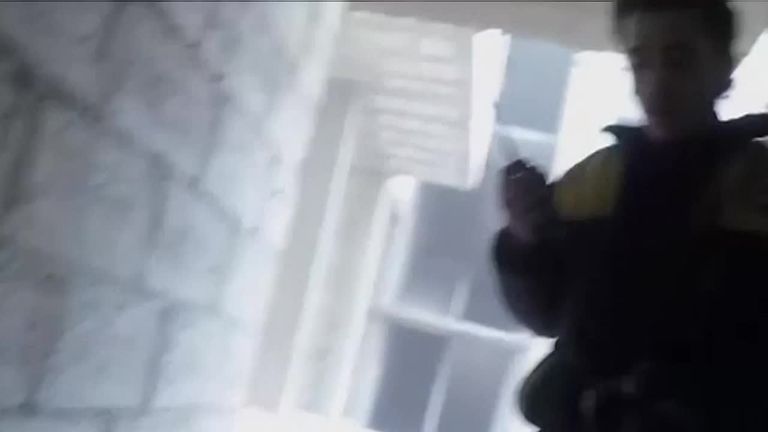First day of eastern Ghouta 'truce' in Syria branded a farce
A five-hour stoppage was meant to allow residents to leave and allow aid deliveries in but there was no sign of either happening.
Tuesday 27 February 2018 21:55, UK
A "humanitarian" pause in Russian airstrikes in the Syrian rebel-held enclave of eastern Ghouta failed to result in aid deliveries or medical evacuations as fresh violence erupted.
A five-hour daily stoppage was agreed for this week from 9am to 2pm, and was meant to allow residents to leave the besieged suburb on the edge of the capital Damascus and allow aid in.
But the first attempt at a ceasefire has seemingly failed.
A UN spokesman said they had reports of continuous fighting in eastern Ghouta, adding: "Clearly the situation on the ground is not such that convoys can go in or medical evacuations can go out."
People living in the area of Ghouta called it a "farce".
A corridor was set up for residents, who have been under siege for weeks, to leave - but no civilians used it.
One activist said: "People are still in shelters. They didn't leave it because they have no confidence in the Russian and Syrian governments."
The International Committee of the Red Cross has said it was ready to enter the enclave to deliver life-saving aid, but the five-hour period was too short.
State-run news agencies claimed that rebels continued shelling, although this has not been independently confirmed.
The truce was organised by Russia, President Bashar al Assad's main ally, and Russia's foreign minister Sergei Lavrov has insisted that they will press on with the plan for more daily pauses in fighting.
But the UN is instead backing a broader 30-day ceasefire at the weekend but which has yet to be agreed.
The Syrian regime sent buses to the al Wafideen checkpoint so residents wanting to use a humanitarian corridor could flee what the UN describes as "hell on earth" in the seven-year war.
But no civilians were seen heading towards the checkpoint, where large portraits of Mr Assad and Russian President Vladimir Putin stood side-by-side.
Many said they feared harassment or arrest if they go into government areas after years of living in the rebel-controlled area.
"Anyone would face a number of dangers at any moment if they step into Damascus, either by arrest or by questioning family members. We in Ghouta we have no way out," said Nemaat Mohsen, who lives in the town of Saqba.
More than 550 civilians have been killed since 18 February in bombardments by the Syrian government and Russian forces in eastern Ghouta, a suburb of 400,000 people.
The level of violence was significantly lower on Tuesday as the "pause" began but six civilians were killed in bombardments by the regime, according to the Syrian Observatory for Human Rights monitoring group.
Two people were killed before the declared five-hour window, two during and two after, said the UK-based organisation, adding the bombings intensified again later.
Russia accused rebels of attacking government forces with artillery and small arms fire in the Hazrama and Nashabia settlements during the "pause".
Moscow also accused militants of firing mortar shells at a humanitarian corridor between Harasta and Douma.
Meanwhile, the United States said Russia is playing a destablising role in Syria and is acting as "both arsonist and firefighter".
US Army General Joseph Votel said Russia was "fuelling tensions among all parties in Syria... then serving as an arbitrator, to resolve disputes, attempting to undermine and weaken each party's bargaining positions".






